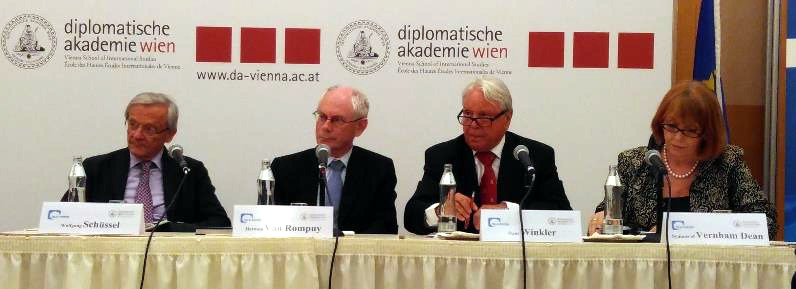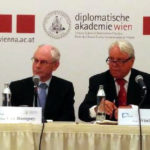State of the union

Event data
- Datum
- 6. 6. 2016
- Host
- Diplomatische Akademie Wien
- Location
- Diplomatische Akademie Wien
It was a very illustrious group tonight, discussing the EU’s state and current problems before a relatively small audience. As expected, Britain’s forthcoming referendum (“Brexit” – meaning the termination of Britain’s membership of the European Union) figured prominently.
Herman Van Rompuy highlights the EU’s successes (eg. the rescue of the Euro), and stresses the particularly difficult conditions (banking crisis, refugee crisis). He praises the EU’s deal with Turkey ( “not all problems are solved, but imagine the problems without the deal”) and shows understanding for the duration of many decision-making processes, since 28 Member States have to be coordinated. Van Rompuy does not see the crisis as limited to Europe, but as a crisis of our democracies, and speaks of a fragmentation ‘and’ polarization’ of Europe, as well as growing populism. He realizes that it is not the time to think about “United States of Europe”. But although he can understand this pragmatic approach, visions and dreams should never be forbidden. He sees a “Europe of necessity” (enthusiasm on the population’s part would be good, but is not absolutely necessary) and calls for a “Europe of results”. Europe needs to achieve success, among other things, in the area of unemployment, the refugee issue or a declining inequality.
Van Rompuy justifies the former association agreement with Ukraine, Georgia and Moldova. A long-term solution in the Ukraine issue is needed before the sanctions against Russia can be terminated.
A Brexit, Van Rompuy refers to as “amputation of Europe”, which could be interpreted as the beginning of the end. Baroness Symons Vernham Dean sees the UK split on the issue of a Brexit. The media are campaigning mostly in favor. The top three issues relate to the economy, migration and sovereignty.
Vernham Dean praises the results of Cameron’s negotiations with the EU, even though he belongs to the rival party, and makes no secret of her convinced pro-EU stance. She fears a devaluation of the British pound and a new referendum in Scotland, which, in case of a Brexit, would result in a breakup of Britain.
Vernham Dean names Egypt as an example, where greatest need is present and where she wishes for more EU involvement. Illiteracy is high and the economy has got big problems there. “It’s about poverty!” – “If Egypt goes, then Jordan and Lebanon go”.
Wolfgang Schüssel regards the EU’s reality better than public opinion. The main problem are the many simultaneous issues. The EU has to export stability, not to import instability. The development of Frontex is of high importance.
Schüssel is concerned for the confidence of policy makers who are holding too many referendums that are neither politically nor legally necessary. The people do not decide on the actual question of the referendum, but on the governments. Schüssel fears that a Brexit could become a role model for other countries (such as Italy). The result of the current mayoral election in Rome, he commented with a sarcastic “Wonderful!”.
To prevent these trends, the EU must bring up their sleeves and get itself to function together. First and foremost, alongside rational arguments, it is important to also convey other aspects, such as culture or peace.
Schüssel stressed, that in addition to the far-right parties there also parties positioned very far to the left, that even concur in their demands in some aspects. There are two factors, the fear factor and that of hope.
“Europe is about hope, not about fear!”
In the Brexit-question both camps are leaning on the fear factor. An outside interference would be counterproductive. Schüssel recognizes well, that ‘less EU’ would work better in some areas, but also emphasizes that ‘more’ is needed in other fields.
As expected, all three debaters emphasize the importance and the achievements of the EU and speak decidedly against a Brexit.
At the same time they are looking for solutions to the EU-disenchantment of the public. Van Rompuy calls for results to convince the population of the EU’s importance, Schüssel proposes to take more than purely economic aspects into account and to place the factor of hope above the fear. Vernham Dean is committed to more presence (,visibility’) of the EU, for example in conflict areas such as Egypt.
All in all, an interesting policy evening with renowned lecturers and few surprises.
Translation from German: Serena Nebo
Credits
| Image | Title | Author | License |
|---|---|---|---|
 |
State of the Union | Thomas Farthofer | CCBY-SA 4.0 |
